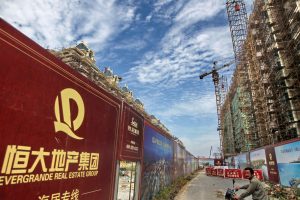Evergrande, China’s wobbling property developer, has found itself the subject of global concern and speculation as it seeks a way out of a tightening liquidity crunch and serious over-indebtedness. Analysts are talking about whether Evergrande will default on its debts, pay them off by generating cash through sales of its electric car and property management businesses, or face a bailout by the government.
Evergrande’s problems are not small: the company has more than 70,000 investors and stalled construction on homes for over a million home buyers. Yet we can assume there will be other Evergrandes in the future due to structural flaws in China’s financial system. This is because Evergrande isn’t the problem; it’s a symptom of the problem.
The main issue is over-indebtedness, created by a system in which risky entities are allowed to borrow for an extended period of time before facing a reckoning that threatens to disrupt social stability and harm investors and industry competitors. This occurred in China’s shadow banking sector in spades, as risky firms borrowed excessively for several years before receiving strong regulatory containment. This happened among state-owned enterprises in the wake of the Global Financial Crisis, as firms borrowed in order to build up infrastructure and stimulate the economy. The situation was allowed to run until the government initiated the deleveraging campaign in 2017.
The real estate sector in particular has experienced rising prices over the past 20 years, creating an asset price bubble born of insufficient investment outlets for households and the desire to ensure ever-rising prices in order to maintain social stability. The government has attempted to dampen housing speculation and over-indebtedness among property developers. Regulators drew up the “three red lines” policy in 2020 to deleverage the balance sheets of property developers. The three red lines state that developers must have a liability-to-asset ratio of less than 70 percent, a net gearing ratio of less than 100 percent, and a cash-to-short-term debt ratio of more than 1. Developers have three years to implement this policy, which is likely to reduce developer over-indebtedness going forward.
However, in the short run, investors, lenders, employees, and home buyers will experience some anguish. Investors have been demanding repayment on overdue financial products, and both investors and home buyers have engaged in protests across China as fear of default and nondelivery of completed homes mounts.
What is unique about the Evergrande debacle, as compared to other bouts of debt destruction, is that the systemic risk now stems from one company. Indeed, the firm is so large and interconnected that it has been compared to Lehman Brothers and its collapse in 2008. While the U.S. and Chinese financial systems are vastly different, with government intervention in the financial system in China far from an exception, the comparison is accurate in that both firms engaged in irresponsible activities when times were good and later faced the specter of sudden illquidity when financial conditions deteriorated. In China’s case, the deterioration was to some extent self-imposed due to tightening restrictions on real estate firm indebtedness.
There is also concern that a liquidity crunch and heightening risk could spread across financial markets, threatening the viability of banks with large loans to the real estate sector and dampening real estate asset prices overall. Already, the yield on an index of dollar-denominated junk bonds has climbed to about 14 percent. Increased financial fragility would have a contagious effect on the real economy by tightening financial conditions.
Even after the Evergrande issue is resolved, China’s over-indebtedness disease is likely to continue, as debt is allowed to run unconstrained in particular areas of the economy until it’s too late to prevent any type of fallout. This is due to financial underdevelopment, creation of asset price bubbles, and moral hazard caused by the assumption of a government bailout in bad times. Regulations after the fact can alleviate the symptoms but do not always prevent the over-indebtedness predicament from arising in the first place. China’s unique blend of state and market economies has proved inefficient when it comes to ensuring healthy levels of leverage, and financial deepening and better application of market forces are necessary to remove the specter of debt buildup in the future.

































